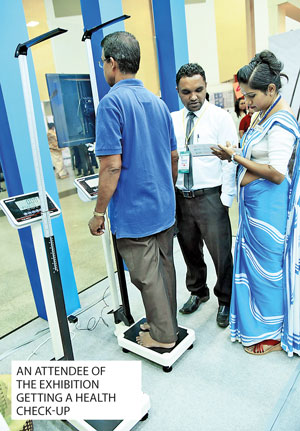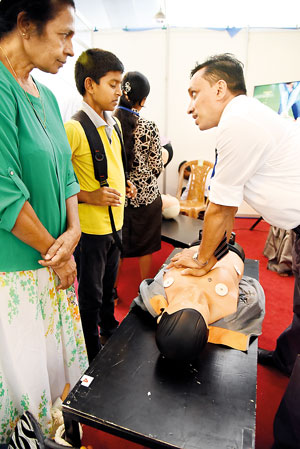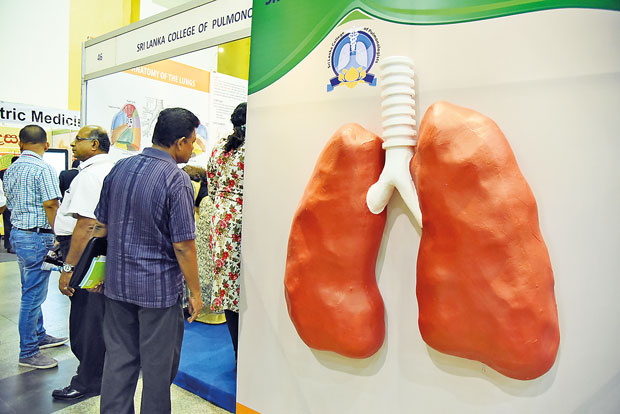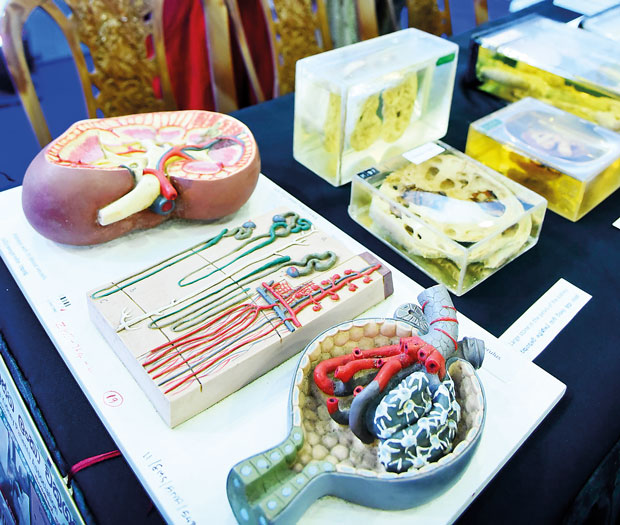19 Jul 2017 - {{hitsCtrl.values.hits}}

Fetal specimens displayed at the exhibition
 Health is a trending topic at the tip of every one’s tongue today. There are many diseases that endanger one’s health with many more new diseases being discovered daily. Some can be cured while others can’t. Some may be fatal while others aren’t. The phrase ‘health is wealth’ stays true to every word in the phrase and many more people have started paying attention and caring for their health than in the past. The public’s interest on medical issues has increased over a period of time. For the people who are eager to maintain healthy lifestyles today, ‘Mahajana Suwa Dhana’ emerged victorious in serving just that purpose.
Health is a trending topic at the tip of every one’s tongue today. There are many diseases that endanger one’s health with many more new diseases being discovered daily. Some can be cured while others can’t. Some may be fatal while others aren’t. The phrase ‘health is wealth’ stays true to every word in the phrase and many more people have started paying attention and caring for their health than in the past. The public’s interest on medical issues has increased over a period of time. For the people who are eager to maintain healthy lifestyles today, ‘Mahajana Suwa Dhana’ emerged victorious in serving just that purpose.
‘Mahajana Suwa Dhana’, a medical exhibition organized at the BMICH, in commemoration of the 50th anniversary of the Ceylon College of Physicians commenced on July 14 and will conclude on July 16. It served the purpose of educating the public on the latest developments in medicine and empowering their audience in health management. Specialists from medical associations and medical faculties from all over the country joined forces to help raise awareness to inquiring minds. The event was graced by the presence of the Minister of health, nutrition and indigenous medicine, Rajitha Senarathna, as the chief guest.

Dr. Dumitha Govindapala, Consultant Physician, commented on the exhibition’s events. “We had more than a 100 stalls. All the medical specialists came together from around 40 colleges which included Medical colleges, NDCU, Blood Donation campaign, Saukyadana, and many others. Our health status has been double burdened with communicable and non communicable diseases. The country spends a lot of money to cure the diseases . Sticking to the statement that ‘prevention is better than cure’, we hoped that the conduction of this exhibition would help in educating public and raising awareness. There were blood tests conducted free of charge courtesy of the Ministry’s mobile Laboratory services. There was a stall organized by the Ceylon College of Internal Medicine where free consultations were offered to the public among other programs we conducted.”
The public was open to panel discussions conducted by consultant physicians of common health conditions such as diabetes, heart attacks, asthma, dengue and high blood pressure where the public very keenly got involved, getting their doubts clarified. The highlight of the exhibition was the very many health educational stalls exceeding 100 in number through which presentations were conducted to raise awareness on common medical conditions, screening, diagnosis, treatments and preventive methods.

There were many medical areas for one to explore which included a high tech zone which allowed the audience to have a glimpse at the future of medicine with holograms and virtual 3D imaging in amazement. The importance of physical fitness and exercises was discussed at stalls in the sports area which got the crowds to actively participate in exercises. The current epidemic, dengue, earned itself a special stall where the do’s and don’ts of dengue were stressed. There were stalls on toxicology held in hope of educating all nature daredevils on poisonous plants and snakes. For those who love a good thrill and all things criminal and mysterious, a forensic section was available. The same can be said about the inquisitive and curious, as they were satisfied with the stalls themed on anatomical mysteries of the human body. Stalls were also held in connection with subjects like sexual health, alcohol and smoking issues and rehabilitation. The healthy lifestyle zone as the name implied, helped educate the public on how to get the best of life. The public also basked in the opportunities of free health check-ups such as blood tests, blood pressure checks, blood sugar checks, cholesterol checks and last, but not least hearing and vision.
A stroll through the stalls
The Sri Lankan Heart Association, at their stall were focusing on the importance of recognizing heart attacks and seeking immediate help. Dr. M. R. Mubarak, Consultant Cardiologist and the president of the SLHA said that most people ignore the symptoms of a heart attack mistaking them for indigestion, arthritic pains etc. He said that most patients arrive at the hospital when the situation is critical. He said that early admission is a major factor that improves the outcome of a heart attack. Patients having a heart attack usually present with chest pain and tightness on the central and left side of the chest, arm pain, pain in the neck lower chest or upper abdominal area, shortness of breath, excessive sweating, nausea and vomitting. It is advisable for them to seek immediate medical care if a person is having one or more of these signs.
Geriatrics is a relatively new field of specialty in Sri Lanka, focusing on the medical issues that come with old age. Their theme for this year was, ‘for a dignified Silver age’, meaning that getting old doesn’t mean that you have to depend on others and be less active than you used to be. The stall offered information about issues like Dementia and osteoporosis which are common problems with older citizens.
 The stall of the College of Pulmonologists
The stall of the College of Pulmonologists
Sri Lankan Eye Donation Society had a stall where they explained the importance of donating eyes posthumus. Your age or poor vision doesn’t matter in donating your eye tissues, which will be processed by the eye bank and will be donated for free to a person who will continue to see the world through your eyes, long after you’ve departed. You can get more details on donating your eyes and body tissues by contacting National Eye Donation Society at 011-2692051.
Sri Lankan College of Pulmonologists had demonstrated the latest advancements in the field of pulmonology, including Endobronchial Ultrasound Scan and Fiber Optic Bronchoscopy. In addition to providing details about the commonest respiratory diseases like Asthma and COPD, they highlighted the importance of a condition called ‘Obstructive Sleep Apnoea’ which can be present in people who are snoring. This condition should be taken very seriously because it has very damaging repercussions. It has been proven that people with this condition are more prone to get depression and have a higher chance of getting into accidents in addition to other complications. So if you snore heavily in your sleep and feel tired soon after waking up, Dr Bodhika Samarasinghe, Consultant Pulmunologist at the Jaffna hospital advises to consult your family physician immediately.
In addition to the stalls by the specialist Colleges, and Societies in the field of Medicine, Some of the Medical Faculties also had participated in the event. The stall conducted by the Medical Education Department, Faculty of Medicine, University of Kelaniya was focused on the use of Modern technology in Medical Education. The stall was a perfect example of how the traditional could be incorporated with modern technology to give an optimum earning experience to the student. The stall had supplied the audience with an interactive experience, where they got to experience first hand the technologies like virtual reality. Dr. Madhawa Chandrathilake, Head of the Department of Medical Education, speaking about the contents in the stall said that even though these technologies are rarely used in teaching these days, this will be the future of medical education.
 Models of kidneys and nephrons
Models of kidneys and nephrons
Among the stalls were the ones conducted by the Ceylon College of Anaesthesiologists, where practical demonstrations on first aid methods like Cardio Pulmonary Resuscitation were available to the public. They were able to garner knowledge on what should be done on various emergency situations like choking and cardiac arrest. Another stall on Critical Care Medicine demonstrated an ICU setting, where a patient with serious conditions at risk of losing organ functions are treated with each organ supported by an outside machine, and how they are gradually weaned off the machine when they are getting better.
Sri Lanka Medical Nutritionist’s Association demonstrated the ideal diet for a healthy Sri Lankan, where only half of the plate should consist of rice. Two thirds of the remaining part should consist of vegetables while the other one third should contain proteins. The high risk Sri Lankan citizen faces the danger of suffering non communicable diseases like Diabetes due to their incorrect food habits.
In the overall, the exhibition provided a deep insight and a thorough exposure to the various intricasies linked with modern medicine.
Pics by: Kushan Pathiraja
23 Dec 2024 8 hours ago
23 Dec 2024 9 hours ago
23 Dec 2024 23 Dec 2024
23 Dec 2024 23 Dec 2024